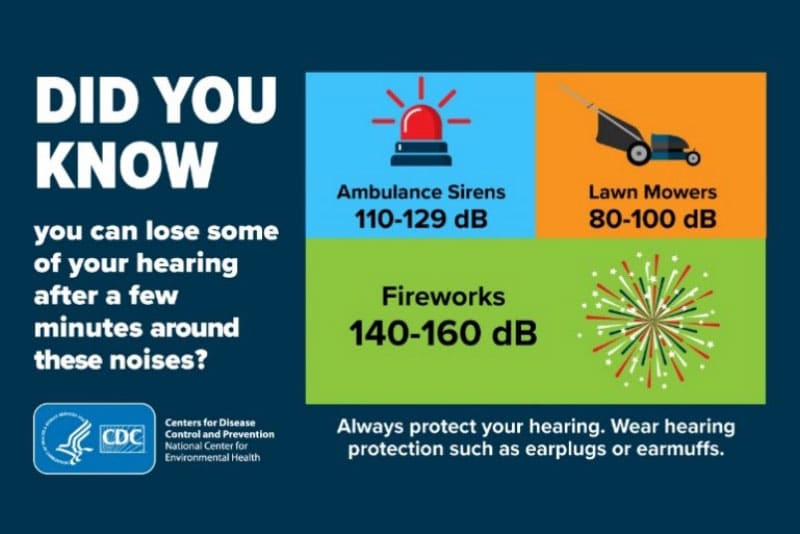Hearing Loss: Protect Yourself and Your Family this Summer

Many summer activities that produce loud noises, repeated over time, can contribute to hearing loss.
How do loud noises cause hearing loss?
Typically, everyday sounds don't damage hearing. However, many of us participate in activities that produce sound levels that are more excessive and harmful than we realize.
Loud noise can damage sensitive parts of the ear, causing ringing or buzzing in the ear (tinnitus), increased sensitivity to sound (hyperacusis), and hearing loss. Repeated exposure to loud noise over time can result in hearing problems, even after the exposure has stopped.
What types of activities can expose you to excessive noise levels?
- Setting off fireworks, or sitting or standing less than 500 feet from fireworks explosions
- Mowing or using a gas-powered edgers
- Using power tools
- Attending concerts
- Jet skiing or motor boating
- Revving motorcycles or car engines
How can you protect yourself and your family from hearing loss?
Avoiding unnecessary noisy situations is the best prevention. But you can still participate in and enjoy the above activities by reducing your exposure to noise levels that can cause hearing loss.
The best way to "lower the volume" and still do the things you enjoy is to use adequate hearing protection, such as earplugs and earmuffs.
The Moultrie County Health Department joins the National Center for Environmental Health (NCEH) at CDC in recommending the use of hearing protection devices while participating in or attending noise-producing activities this summer.
Further CDC recommendations to help prevent hearing loss from loud noises
At Fourth of July celebrations:
- Explosive sounds like firecrackers are more hazardous to hearing than other loud noises.
- Wear earplugs or earmuffs if you will be exposed to the noise of firecrackers.
- Maintain your distance – If a firecracker explodes near your ear, you could experience immediate hearing damage.
- Hearing protection is a family affair. If you’re going to a fireworks show together, everyone should wear earplugs or earmuffs to protect their hearing.
- Talk to your doctor if you notice any lingering pain, discomfort, ringing, or buzzing in your ears after the noise exposure has ended.
At Home:
- Turn down the volume of the TV, radio, or music.
- If listening to loud music, take listening breaks to reduce exposure.
- Use quieter products (power tools, toys, recreational vehicles). You can visit the CDC’s Buy Quiet webpage for additional product categories.
- Use hearing protection devices (such as earplugs or earmuffs) when loud sounds are unavoidable.
- Keep children away from loud music or equipment at home.
At Public Events:
- Limit the time of exposure to loud sounds.
- Pay attention to signs and information warning of possible loud noise or recommending the use of hearing protection.
- Keep hearing protection devices in your car, pocket, purse, backpack, or other accessible places. You want them to be available for your family when needed!
- Encourage your family, friends, neighbors, and coworkers to protect their hearing while enjoying their favorite activities.
Please practice hearing protection year-round. If you are well-prepared, you can protect yourself and your family from hearing loss this summer and throughout the year.
Content Sources:
Fireworks Safety Month!
How Do I Prevent Hearing Loss from Loud Noise?
Loud Noise Can Cause Hearing Loss
July is Fireworks Safety Month! Take Care to Protect Your Hearing
Buy Quiet

